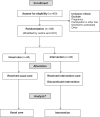Multicentre randomized controlled trial of structured transition on diabetes care management compared to standard diabetes care in adolescents and young adults with type 1 diabetes (Transition Trial)
- PMID: 24106787
- PMCID: PMC3879408
- DOI: 10.1186/1471-2431-13-163
Multicentre randomized controlled trial of structured transition on diabetes care management compared to standard diabetes care in adolescents and young adults with type 1 diabetes (Transition Trial)
Abstract
Background: Transition from pediatric to adult diabetes care is a high risk period during which there is an increased rate of disengagement from care. Suboptimal transition has been associated with higher risks for acute and chronic diabetes-related complications. The period of emerging adulthood challenges current systems of healthcare delivery as many young adults with type 1 diabetes (T1D) default from diabetes care and are at risk for diabetes complications which are undetected and therefore untreated. Despite the importance of minimizing loss to follow-up there are no randomized control trials evaluating models of transition from pediatric to adult diabetes care.
Methods/design: This is a multicentre randomized controlled trial. A minimum of 188 subjects with T1D aged between 17 and 20 years will be evaluated. Eligible subjects will be recruited from three pediatric care centres and randomly assigned in a 1:1 ratio to a structured transition program that will span 18 months or to receive standard diabetes care. The structured transition program is a multidisciplinary, complex intervention aiming to provide additional support in the transition period. A Transition Coordinator will provide transition support and will provide the link between pediatric and adult diabetes care. The Transition Coordinator is central to the intervention to facilitate ongoing contact with the medical system as well as education and clinical support where appropriate. Subjects will be seen in the pediatric care setting for 6 months and will then be transferred to the adult care setting where they will be seen for one year. There will then be a one-year follow-up period for outcome assessment. The primary outcome is the proportion of subjects who fail to attend at least one outpatient adult diabetes specialist visit during the second year after transition to adult diabetes care. Secondary outcome measures include A1C frequency measurement and levels, diabetes related emergency room visits and hospital admissions, frequency of complication screening, and subject perception and satisfaction with care.
Discussion: This trial will determine if the support of a Transition Coordinator improves health outcomes for this at-risk population of young adults.
Trial registration number: NCT01351857.
Figures
References
-
- Peters A, Laffel L. the American Diabetes Association Transitions Working Group. Diabetes care for emerging adults: recommendations for transition from pediatric to adult diabetes care systems. Diabetes Care. 2011;13(11):2477–2485. doi: 10.2337/dc11-1723. A position statement of the American diabetes association, with representation by the American college of osteopathic family physicians, the American academy of pediatrics, the American association of clinical endocrinologists, the American osteopathic association, the centres for disease control and prevention, children with diabetes, the endocrine society, the international society for pediatric and adolescent diabetes, juvenile diabetes research foundation international, the national diabetes education program, and the pediatric endocrine society (formerly Lawson Wilkins pediatric endocrine society) - DOI - PMC - PubMed
-
- Bazata DD, Robinson JG, Fox KM, Grandy S. SHIELD Study Group. Affecting behavior change in individuals with diabetes. Findings from the study to help improve early evaluation and management of risk factors leading to diabetes (SHIELD) Diabet Educ. 2008;13(6):1025–1036. doi: 10.1177/0145721708325767. - DOI - PubMed
-
- Berkowitz S. Transitioning adolescents to adult care: putting theory into practice. Minn Med. 2009;13(3):42–44. - PubMed
Publication types
MeSH terms
Associated data
LinkOut - more resources
Full Text Sources
Other Literature Sources
Medical


